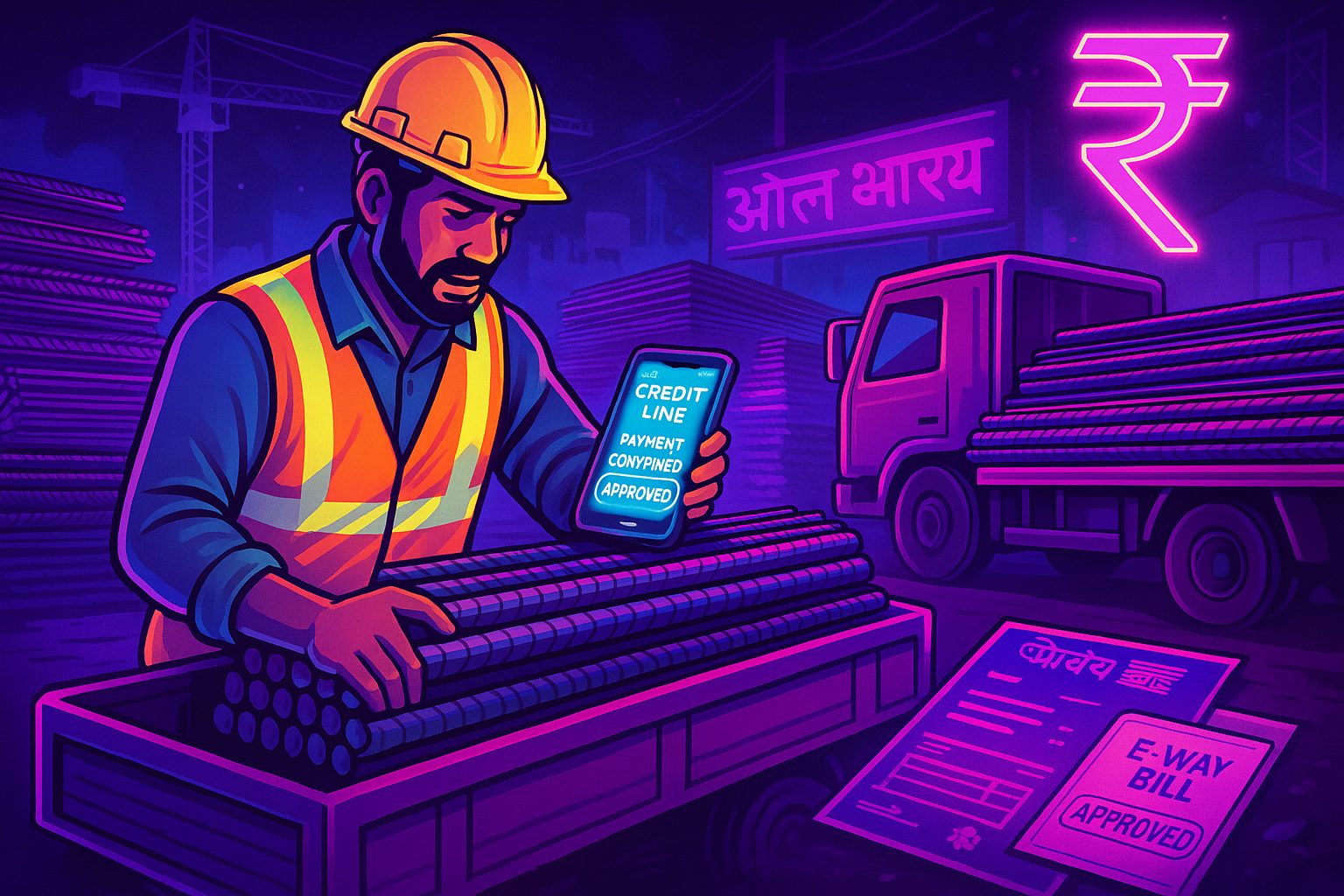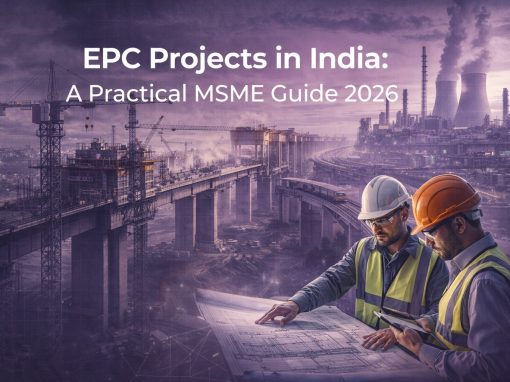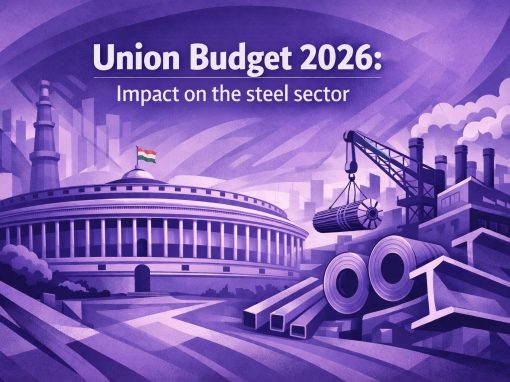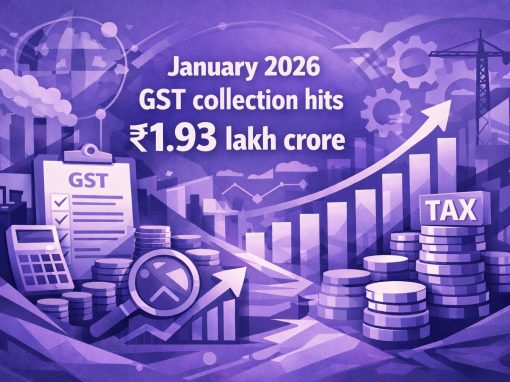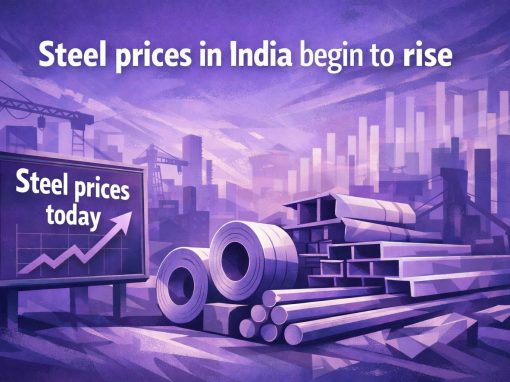Table of Contents
- Introduction
- Formal vs Informal Credit
- Reason 1: Maintain predictable cash flow cycles
- Reason 2: Reduce landed cost and capture GST benefits
- Reason 3: Stay compliant with government procurement norms
- Reason 4: Build credibility with mills and distributors
- Reason 5: Drive business growth with the right credit support
- What are the advantages of formal credit?
- Conclusion
- FAQs
Steel, as we know, is one of the most important purchases for businesses in India. It is not a one-time buy. Instead, it is a large, recurring cost that directly affects both profits and delivery timelines.
In most businesses:
- Invoices run longer than the actual cash in hand.
- Freight and labour payments come due before buyers release funds.
- Suppliers ask for advance security to block steel at a fixed price.
When companies depend on informal borrowing to bridge this gap, three problems appear quickly:
- High and uneven interest rates
- No tax benefit or input credit trail
- Limited trust from large mills and distributors
Formal credit changes this picture. Options such as bank working capital loans, TReDS platforms, or invoice discounting provide:
- A predictable cash cycle to keep operations steady
- Proper documentation for GST and audit compliance
- Credibility with distributors, which matters when supply is tight
Think of it this way: Formal credit for steel procurement is not just money borrowed; it is a business strategy. It reduces landed cost per tonne, ensures compliance with government rules, and gives MSMEs a stronger footing in both private and public contracts.
By the end of this blog, you will understand the key reasons why formal credit for steel procurement makes purchase more predictable, cost-efficient, and reliable for MSMEs.
Formal vs Informal Credit
Steel buyers need credit to keep orders moving. Most MSMEs arrange money in two ways. Some depend on local lenders or personal contacts. Others use banks, NBFCs, or platforms backed by the government. Both options fill cash gaps, but their effect on cost, records, and supplier trust is not the same. Here’s a quick comparison between both:
| Aspect | Informal Credit | Formal Credit |
| Source | Local lenders, friends, personal networks | Banks, NBFCs, TReDS, SIDBI, guarantee schemes |
| Cost | Often high, changes with each lender | Fixed rates, regulated and transparent |
| Paperwork | Almost none, mostly cash-based | Proper documents and GST invoices |
| Tax benefit | No GST input credit | Input credit available, supports compliance |
| Reliability | Depends on lender’s mood and limit | Predictable, can grow with business |
| Supplier view | Less trust, allocation delays | Builds credibility, better terms |
| Future impact | No credit history, harder to win tenders | Builds score, improves tender eligibility |
Reason 1: Maintain predictable cash flow cycles
Steel is not a small-ticket purchase, for e.g., it is not something like buying stationery or small spare parts. However, each order is bulky, high-value, and often tied to strict project timelines. Every order runs into lakhs of rupees and ties directly to project milestones. For an MSME, one delayed payment can block the entire working cycle.
Where the gap starts
- Advance or part-payment is usually asked by mills and distributors before dispatch.
- Transporters and loaders want cash on delivery, not credit slips.
- Client receivables stretch 30 to 60 days, sometimes longer on government projects.
The result: money flows out quickly but comes back slowly. Businesses that rely on informal borrowing struggle here. Local lenders may bridge the gap, but interest rate is high, paperwork is absent, and repayment is rigid.
How formal credit changes the picture
A sanctioned credit line means MSMEs aren’t stuck waiting for money to show up. Bills for freight, unloading, and everyday wages get settled on time, and the workflow doesn’t stall.
For the buying desk, that reliability is gold. It allows managers to look a few steps ahead – placing bulk orders when it makes sense, rather than scrambling for short lots at premium prices. In steel, stability in buying usually beats chasing the last rupee of discount.
Reason 2: Reduce landed cost and capture GST benefits
For a steel buyer, the invoice from the mill is never the final cost. By the time the truck reaches the yard, expenses for freight, unloading, and taxes get added. What the business really looks at is the landed cost per tonne.
Where informal credit hurts
Small firms often turn to local financiers when cash is tight. The money comes fast but at a high rate, sometimes with no paperwork. That extra interest has to be absorbed in the project cost. Worse, without a formal invoice trail, the GST input credit is lost. Many MSMEs realise too late that they are paying more than competitors who rely on bank or platform-based credit.
How formal credit improves margins
A working capital line or invoice discounting arrangement ensures every rupee has documentation. The GST component on purchases can be claimed, directly reducing the effective price of steel. Because charges are known in advance, managers can plan bulk orders with clarity. Timely and recorded payments also give distributors the confidence to pass on early-payment discounts, something rarely available when cash comes from informal sources.
In a market where margins are tight and bids are won or lost by small differences, even a two per cent saving on landed cost can decide the outcome. Formal credit gives MSMEs that edge by keeping the books clean, the costs transparent, and the steel more affordable.
Reason 3: Stay compliant with government procurement norms
When an MSME supplies steel to a government project, payment rules are strict and the paperwork has to be watertight. That said, Section 43B(h) of the Income Tax Act and the MSMED Act both insist on the same thing that any dues to MSME must be settled on time. Now, the question that arises here is what if payments are delayed or paperwork is incomplete? Any delay can mean the buyer can lose tax deductions or benefits related to it and the supplier can rightfully claim interest on late payments.
If payments are delayed or paperwork is incomplete, the buyer can lose tax deductions and the supplier may be entitled to penalty interest.
Why informal borrowing creates compliance risk
- Cash loans usually have no paperwork. Later, it becomes difficult to prove which payment was linked to which order.
- During audits, missing records invite questions and can delay payments.
- In tenders, buyers often ask for proof of payment discipline. An MSME depending on informal borrowing has very little to show.
How formal credit keeps businesses compliant
- Bank credit or TReDS always generates invoices and receipts. These documents make it easy for auditors to verify transactions.
- Every purchase is tied to GST, so the business can claim tax benefits and also show a clean trail to procurement officers.
- Schedule III of the Companies Act also requires ageing of MSME payables in financial statements. Relying on formal credit keeps payments on track, that help improvise both compliance and business reputation.
- Also, with scheduled repayments, businesses avoid delays and penalties under the MSMED Act.
- This constant record of timely payments, thus helps position the business as trustworthy and reliable when you are bidding for tenders.
That said, by relying on formal credit for steel procurement, businesses not only avoid penalties but also strengthen their eligibility in government contracts.
Reason 4: Build credibility with mills and distributors
In the steel trade, reputation is built on timely payments. A mill or distributor is more willing to allocate stock to a buyer who has a steady track record than to one who is always uncertain about funds. For an MSME, using formal credit for steel procurement becomes a signal of reliability.
Why informal borrowing weakens trust
- With cash borrowing, there’s no record to fall back on. And thus, suppliers struggle to know if a buyer is financially sound.
- And when funds are arranged in a hurry, orders don’t move on time and shipments get delayed – straining ties with the supplier.
- Distributors become cautious. Without a reliable track record of payment history, they are not in confidence and hesitate to offer better rates or flexible credit terms.
How formal credit strengthens relationships
- Payments routed through a bank or platform are documented, so suppliers can see that the buyer is organised.
- Regular settlements build goodwill. During busy seasons, this often decides who gets priority supply.
- If payments are clear and cash flow is predictable, buyers have more room to negotiate on price or lock in supplies.
- With time, that consistency creates partnerships. Suppliers feel confident that the MSME won’t default when the market is under pressure.
Reason 5: Drive business growth with the right credit support
As your business grows, so does the need for steel. A contractor taking on a bigger site or a fabricator increasing production can’t run on the same small cash borrowings anymore. Those quick loans may help for a few lakhs, but the moment your order book runs into crores, local financiers usually step aside. That’s exactly where formal credit – especially with guarantee schemes – gives you the push to grab bigger opportunities without slowing down.
Why informal credit blocks growth
- Local lenders work on small tickets. They are unwilling to fund bigger, long-cycle orders.
- Cash-based borrowing builds no credit history, thus, leaving the business with nothing to show to its repayment discipline.
- Without a clean credit history, it becomes difficult for businesses to approach large mills or qualify for high-value tenders.
How formal credit supports expansion
- A few government schemes like CGTMSE also allow banks to extend loans without heavy collateral. It can be a crucial enabler for smaller firms that seek higher limits.
- Specialised lenders including – SIDBI, design credit products tailored for small and medium sized businesses, helping them secure raw materials and maintain smooth operations.
- With the 2024 Budge expanding guarantee coverage for manufacturing businesses, access to collateral-light loans has widened even further.
- Each repayment on a formal loan adds to your CIBIL credibility. Over time, your credit score gets stronger – and that doesn’t just impress banks, it also gives suppliers confidence that you can be trusted.
- With reliable credit support, businesses gain the flexibility to stock steel when prices are favourable, plan production with confidence, and take on larger projects without funding stress.
- Apart form it, platforms such as TReDS further ease the cycle by turning receivables into instant liquidity, keeping procurement smooth and predictable.
Because real growth isn’t only about machines or manpower. And financial depth is just as critical. Formal credit helps lay that base for businesses, thus helping them expand without depending on costly, short-term borrowing.
What are the advantages of formal credit?
The five reasons we covered above already explain how formal credit supports MSMEs in steel procurement. When seen together, they underline a bigger point – formal credit is not just about filling cash gaps; it strengthens every part of the buying process. Let’s understand in brief all the advantages of considering formal credit to procure steel.
Lower costs
Formal loans usually come with lower and more stable interest than informal borrowing. Because transactions are documented, MSMEs can also claim GST input credit, which directly reduces the landed cost. In many cases, timely payments backed by credit help buyers secure small but important discounts from suppliers.
Security and transparency
Banks and NBFCs work under RBI rules. This protects MSMEs from arbitrary charges or sudden changes. Apart from it, loan terms are also written and clear. This makes planning and repayment far easier compared to cash-based borrowing.
Compliance and credibility
When you borrow via banks or platforms, it always creates records. These documents make audits simpler and give proof of payment discipline in tenders. For suppliers too, regular payments that are easy to track build trust and improve the buyer’s chances of getting better terms.
Stability and growth
When a credit limit is approved, MSMEs can place orders without waiting for client payments. Schemes such as CGTMSE and loans from SIDBI also make higher limits possible, often without heavy collateral. With every repayment, the firm’s profile improves, and this helps in qualifying for larger projects and contracts.
Formal credit for steel procurement, therefore, is not just finance. Rather, it is a tool that helps lower costs, assist businesses with compliance, build trust and offer them a stronger business base to grow.
Conclusion
Steel is a core expense for every MSME, and the way it is financed makes a clear difference. Informal borrowing looks simple, but it adds cost and creates problems during audits or supplier negotiations.
Using formal credit to procure steel does the opposite. Payments stay predictable, records remain clear, and suppliers see the buyer as dependable. With support from government schemes, it also gives smaller firms the chance to scale beyond day-to-day orders.
For MSMEs, the lesson is straightforward: treat credit as part of the procurement strategy, not as an afterthought. Those who shift early to formal channels will find themselves better placed to secure supply, win contracts, and grow with confidence.
FAQs
How does formal credit improve an SME’s chances of winning government steel tenders?
What documents do steel suppliers usually ask for when buyers use bank credit?
Can MSMEs use formal credit to lock steel prices in advance with mills?
Can MSMEs use formal credit lines to buy both raw steel and finished steel products?
Can formal credit be linked directly with logistics payments in steel procurement?
How do TReDS platforms benefit SMEs specifically in steel supply contracts?
Are interest costs under formal credit eligible for tax deduction in procurement cycles?
Can MSMEs combine invoice discounting with formal credit to manage large steel orders?
How do schemes like CGTMSE protect SMEs when steel orders require large collateral?
What are the risks of relying only on supplier credit compared to formal bank-backed credit?
Looking to procure steel?
Tata nexarc helps manufacturers, builders and MSMEs source certified steel products, compare prices, and choose the right grade as per IS codes—with complete traceability and procurement confidence.
Charul is a content marketing professional and seasoned content writer who loves writing on various topics with 3 years of experience. At Tata nexarc, it has been 2 years since she is helping business to understand jargon better and deeper to make strategical decisions. While not writing, she loves listing pop music.



